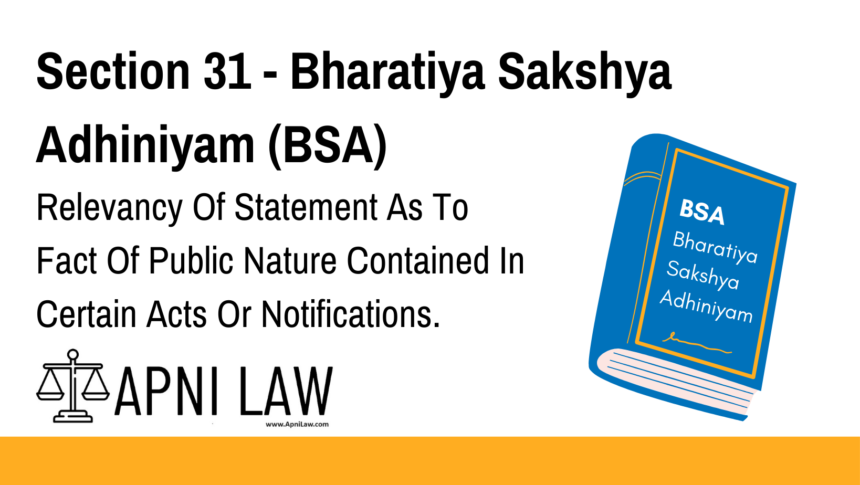Code
When the Court has to form an opinion as to the existence of any fact of a public
nature, any statement of it, made in a recital contained in any Central Act or State Act or in
a Central Government or State Government notification appearing in the respective Official
Gazette or in any printed paper or in electronic or digital form purporting to be such Gazette,
is a relevant fact.
Explanation
Section 31 of the Bharatiya Sakshya Adhiniyam (BSA) makes it clear that if a court needs to determine the existence of any public fact—such as a government decision, a statutory declaration, or the commencement of an Act—it can rely on:
- The recitals (statements) made in any Central or State Act.
- Notifications issued by the Central or State Government.
- Publications in the Official Gazette (whether printed or digital).
Such statements are treated as “relevant facts,” and the law accepts them as prima facie evidence of the existence of a public fact. This provision simplifies legal procedures by recognizing the official nature and credibility of government records.
Illustration
Example 1: Suppose a party claims that a particular village was declared a “Scheduled Area” by the government. If the Official Gazette published a notification to this effect, the court can treat that notification as a relevant fact under Section 31.
Example 2: A dispute arises over whether a particular tax exemption was notified. If the relevant notification is found in the Official Gazette, that is admissible to prove the existence of the exemption.
Common Questions and Answers
1. What is a “recital” in this context?
A recital refers to a formal statement or declaration included in legislation or notifications. These often provide background or describe the purpose and scope of the Act or notification.
2. Are digital gazettes considered valid?
Yes. Section 31 explicitly includes electronic or digital forms purporting to be official gazettes. E-Gazettes hosted on official government portals are considered valid.
3. Can courts rely on government notifications to determine facts?
Absolutely. If the fact is of a public nature and is mentioned in an official notification or Act, the court can accept it as relevant without requiring further proof.
4. What kind of facts are considered “public” in this context?
“Facts of a public nature” typically refer to those that affect the general public, such as changes in administrative jurisdictions, imposition of duties, public holidays, or official appointments.
5. Is a statement in a private newspaper article treated the same?
No. Private publications are not treated the same unless backed by official sources. Only government-issued publications in Acts or Gazettes are covered under Section 31.
Conclusion
Section 31 of the Bharatiya Sakshya Adhiniyam (BSA) provides a clear path for courts to accept statements in Central/State Acts or official notifications as evidence of public facts. This not only saves time but also upholds the reliability of government documents.
Want to explore more sections like this? Browse full BSA commentary with internal links on ApniLaw now.








